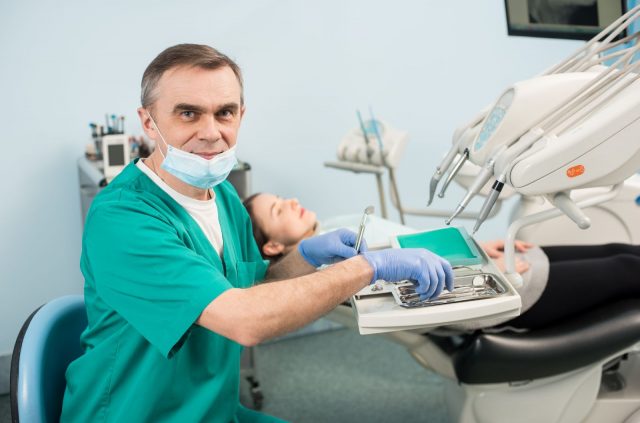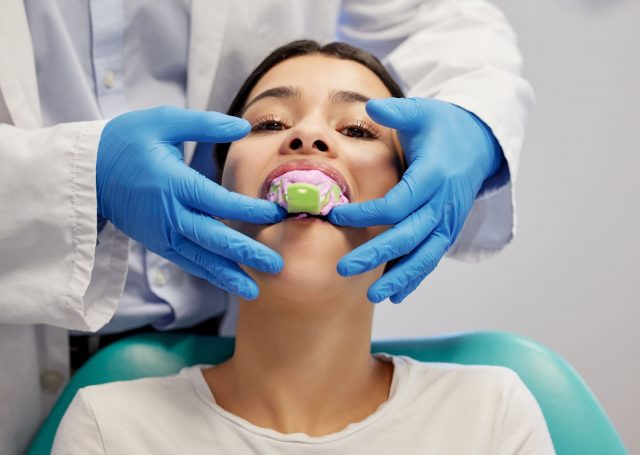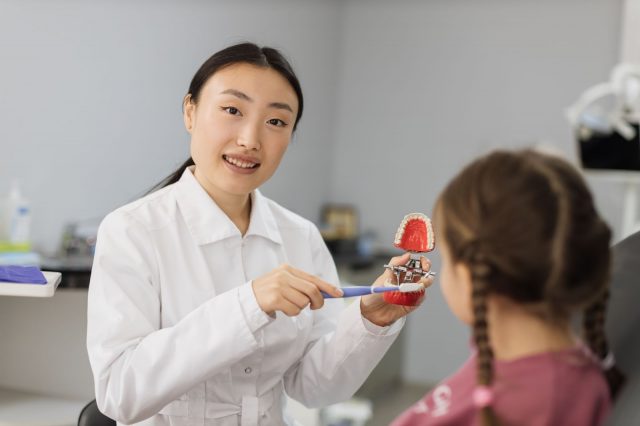(Source: Envato)
It is important to know the difference between a dentist and an orthodontist so you can get the right care for your teeth. General dentists handle general oral health, while orthodontists focus on correcting bites and straightening teeth. Let’s break down what sets a general dentist apart from an orthodontist and why it matters to you.
Dentist vs Orthodontist: Services
A general dentist and an orthodontist both work to improve your oral health, but their roles and services differ. They share some similarities, such as performing routine check-ups and taking X-rays to examine your teeth.
Both also guide patients on oral hygiene and maintaining good dental health. While they are both trained to spot issues like tooth decay or gum disease, they can refer you to other specialists if needed.
However, their focus areas set them apart. A general dentist handles general oral health, including cleanings, fillings, and tooth extractions.
They also treat gum problems and offer cosmetic services like teeth whitening and veneers. A general dentist can address tooth alignment issues, but complex cases will be referred to an orthodontist.
An orthodontist specialises in correcting teeth alignment. They use braces, retainers, and aligners such as Invisalign to fix crooked teeth or bite issues.
Here is a list of services dentists may offer:
General Dentist Services
-
- Routine check-ups and cleanings
- Fillings and restorations
- Tooth extractions
- Root canals
- Crowns and bridges
- Veneers
- Gum care
- Teeth whitening
- Oral cancer screenings
- Dentures
Orthodontist Services
-
- Braces
- Invisalign
- Retainers
- Space maintainers
- Bite correction
- Braces for jaw alignment
- Early interceptive treatment
- Orthodontic appliances
(Source: Envato)
Qualifications
In Singapore, to become a dental surgeon, one must complete a Bachelor of Dental Surgery (BDS) from a dental tertiary institution approved by the Singapore Dental Council (SDC).
Orthodontists have to go through extra training. After becoming a dentist, they must complete a masters orthodontic programme, which typically takes 3 years. This additional training is necessary to grasp the skills needed to correct complex alignment issues.
Furthermore, to practise as a dental specialist in Singapore, orthodontists must obtain accreditation from the Dental Specialists Accreditation Board (DSAB). This involves meeting specific requirements set by the DSAB, which assesses their qualifications and expertise.
Once accredited, they can then apply for registration with the SDC as a specialist. This process ensures they meet the high standards required to provide specialised care.
Letters Stated After a Dentist’s or an Orthodontist’s Name
You might notice letters following a dentist’s or orthodontist’s name. These usually indicate their qualifications or memberships. For example, a dentist will list “BDS” for Bachelor of Dental Surgery, while an orthodontist will have “MDS (Orthodontics)” for Master of Dental Surgery (Orthodontics).
Here is a list of common post-nominal letters for dental professionals:
BDS: Bachelor of Dental Surgery
DDS: Doctor of Dental Surgery
DMD: Doctor of Medicine in Dentistry
MDS: Master of Dental Surgery
MOrth: Member of the Orthodontic Faculty (often from the Royal College of Surgeons, or RCS)
FRCS: Fellow of the Royal College of Surgeons (Orthodontics)
(Source: Envato)
How to Identify a Dental Practice: Office Name
If the dental clinic’s name includes the terms “orthodontics” and “braces”, these clinics likely specialise in dental treatment focused solely on correcting teeth and jaw alignment. In contrast, a general dental practice will typically have “dentist” or “dental clinic” in its name, reflecting a broader range of dental care services.
Which Doctor to Go For Your Dental Issues?
So, who should you visit? For general dental health issues like cavities, gum disease, or regular check-ups, a general dentist is your best choice. If you are dealing with crooked teeth, bite issues, or need braces, an orthodontist is the specialist you will need.
Understanding the difference between a dentist and an orthodontist helps ensure you get the right care for your specific needs. Whether you are maintaining your smile or looking to straighten it out, now you know exactly who to call.
If you have more questions or need help deciding, do not hesitate to ask your current dental care provider. They can guide you to the right specialist and make sure you get the best treatment for your needs.
Conclusion
Choosing between a general dentist and an orthodontist depends on your specific dental needs. Dentists manage overall oral health, while orthodontists focus on correcting teeth alignment. Understanding their roles helps you get the precise care you need for a healthier smile.
Book your appointment with The Braces Practice now and get expert care to achieve the smile you have always wanted.









